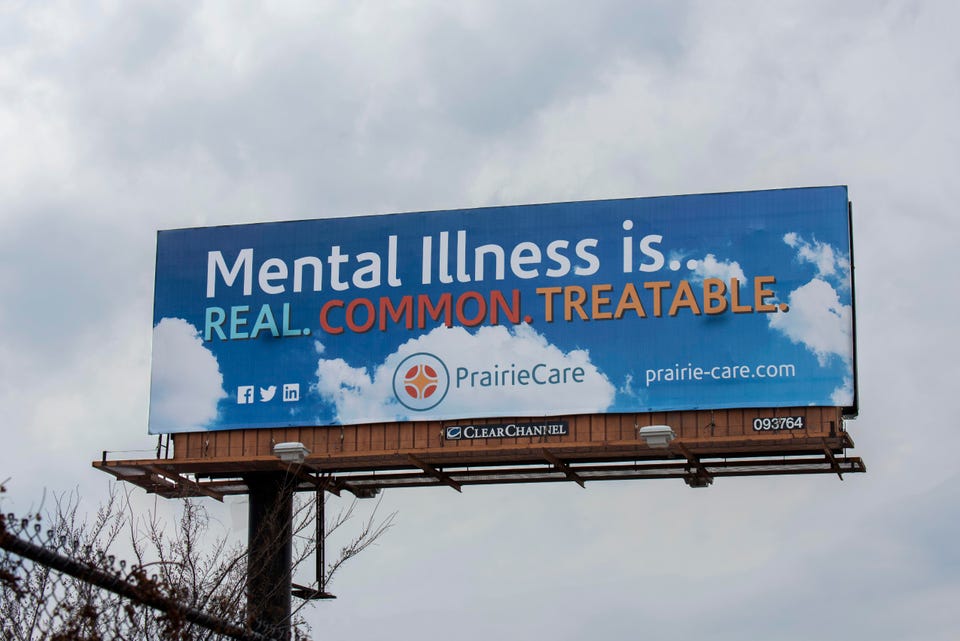Healthcare Mental Health Awareness Isn’t Enough: More Funding Is Needed Joshua Cohen Contributor Opinions expressed by Forbes Contributors are their own. I write about prescription drug value, market access, healthcare systems, and ethics of distribution of healthcare resources Following New! Follow this author to stay notified about their latest stories. Got it! Oct 15, 2022, 05:33pm EDT | New! Click on the conversation bubble to join the conversation Got it! Share to Facebook Share to Twitter Share to Linkedin St.
Paul, Minnesota, Billboard advertisement for a care facility that helps treat mental illness. . .
. [+] (Photo by: Michael Siluk/Education Images/Universal Images Group via Getty Images) Education Images/Universal Images Group via Getty Images Last week was mental health awareness week. It marked the 33rd consecutive October during which advocates in the U.
S. have worked together to sponsor week-long activities, large and small, to educate the public about mental illness. Surely, raising awareness of issues surrounding mental health problems should be the start of a process of addressing them.
Yet, society isn’t doing enough to fund mental health research, provide adequate resources to alleviate shortages in inpatient beds, pay healthcare providers sufficiently, build infrastructure, and cover medical costs for patients. Awareness is a necessary, but not a sufficient condition for tackling the societal problem of mental illness. It’s imperative that mental healthcare receive proper funding and support.
More than one fifth of U. S. adults experienced mental illness in 2020 (nearly 53 million people).
And, 5. 6% of U. S.
adults had serious mental illness in 2020 (more than 14 million people). In 2021, 47,646 people in the United States died by suicide, up from 45,979 in 2020. Experts had hoped that suicide rates peaked in 2018, after steadily rising between 2000 and 2018.
Numbers did fall slightly in both 2019 and 2020. But the 4% increase in 2021 suggests that the two-year decrease was a temporary blip. Psychiatric hospitalization is the treatment option of last resort for individuals with acute or chronic serious mental illness who need intensive, inpatient care.
However, beds are in short supply. The number of psychiatric beds per 100,000 people in the U. S.
ranks 29th among all 38 countries in the Organization for Economic Cooperation and Development. MORE FOR YOU They Inherited Billions Upon Billions: Meet America’s Richest Heirs Jennifer Lopez, Ben Affleck, Jessica Chastain And All The Stars At The Ralph Lauren Show In California Sports Icon Martina Navratilova Battled Tennis Foes On The Court And Breast Cancer Off The Court Recently, the shortage of beds and resources for psychiatric patients has accelerated, leading to serious bottlenecks in hospitals and very long admission wait times. A psychiatrist working at the Massachusetts General Hospital said that in the past week, “we’ve had up to 39 patients in the emergency department looking for psychiatric services, and Monday we had 11 people who had been there at least 100 hours.
” This is unacceptable. Equally inexcusable is the fact that in Massachusetts in 2020 and 2021 more than 350 beds in psychiatric facilities were eliminated amid staffing shortages in the state’s behavioral health system. The system is dysfunctional from top to bottom.
There are much lower reimbursement rates for caregivers involved in behavioral health. In addition, there aren’t the requisite resources needed for a suitable physical foundation – appropriate facilities and building space – for accommodating increasing numbers of mental health patients. Moreover, historically, there has invariably been an unequal playing field between insurance coverage for patients with mental versus physical health issues.
Evidently, misconceptions regarding mental health persist. Nearly a quarter of Americans still don’t view mental health as being as important as physical health. Given this attitude, society appears willing to spend disproportionately much more on somatic diseases than on mental disorders, despite the heavy disease burden and high economic costs caused by mental illness.
And so, there are gaps everywhere, from lack of research dollars – mental health receives nowhere near as much in public donations as somatic diseases do – to subpar treatment coverage. Legislators have attempted to close some of the coverage deficiencies. To illustrate, prescription drug coverage for mental health disorders has improved in the past decade or so, at least in some insurance markets.
In Medicare, for example, anti-depressants and anti-psychotics are included among the six so-called “protected drug classes,” which means that “all or substantially all” medications in those therapeutic categories must be covered by Medicare Part D (outpatient) plans. Also, the Affordable Care Act (ACA) provided one of the largest expansions of mental healthcare coverage to date when it was enacted in 2013. The law requires that most individual and small employer health insurance plans, including all plans offered through the ACA exchanges, cover a fairly comprehensive assortment of mental healthcare services.
However, a large segment of the commercial insurance sector isn’t subject to regulatory guardrails that ensure more equitable coverage of mental healthcare. Additionally, the legislative measures and regulations mentioned above often don’t extend to guaranteed coverage of psychotherapy; for example, cognitive behavioral therapy (CBT). In many instances, CBT is used in conjunction with pharmacotherapy.
Yet, insurers in the public and private sectors often only cover the latter, not the former (or only on a very limited basis). Furthermore, psychotherapy reimbursement rates for healthcare providers have been stagnant or in decline for several decades, which is extraordinary in light of the growing mental health crisis during this period. While there’s improving awareness around mental health and the significant burdens posed by mental illness, society isn’t doing enough to address the problem.
More action is needed. Follow me on Twitter . Joshua Cohen Editorial Standards Print Reprints & Permissions.
From: forbes
URL: https://www.forbes.com/sites/joshuacohen/2022/10/15/mental-health-awareness-isnt-enough-more-funding-is-needed/
